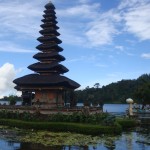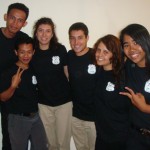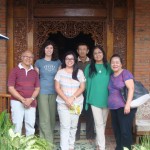
Pura Ulun Danu Bratan, a famous Hindu temple on Lake Bratan near Bedugul, Bali.
Wow, summer is finally coming to a close. Four solid months of summer is a long time without classes, but luckily I had an exciting international experience lined up! I had the chance to go on a Dialogue of Civilizations program to Bali, Indonesia. After the program I also had lined up a twenty-day whirlwind tour of Java to see relatives and family friends, extending my stay to nearly eight weeks.
The Dialogue program focused on social enterprise and how small-scale grassroots organizations can create meaningful change in the community. By the end of the program, the 31 Northeastern students and 31 Ganesha University students had come together to create proposals for ten social enterprises; some non-profits, some social businesses, but all well thought-out, complete plans for creating impactful change in the city Singaraja and the surrounding communities.

My group on presentation day. We designed a non-profit that would provide school uniforms for children, sustained by selling an artistic publication that the students make.
Global Corps Bali was an amazing learning experience for me and a lot of the lessons I learned on the Dialogue came up in new ways when I started my 20-day Java trip. Since I was spending time with family and friends of my grandparents on Java, I really got to see the whole spectrum of how people live in a developing country.
During Global Corps, for instance, my group’s project was first aimed at finding a way to help beggars in Singaraja, but transitioned to working in one specific neighborhood where families struggle to afford to send their children to school (the main expense being the student uniform). During our research days we talked to beggars in street markets and families in one of the poorer neighborhoods near the university.
So after spending a month on Bali thinking about how to make life better for the less fortunate, I traveled to Java to find people living in the exact opposite of what I had seen and studied in Bali. I quickly learned that my relatives and family friends in Indonesia are pretty well-off. Towards the end of my trip I was staying in Surabaya with Tante Timplung, a friend of my grandparents. I had mentioned to her that I wanted to go shopping for some last-minute things I wanted to bring home, so she (along with of her daughters and granddaughter) brought me to a gigantic mall to find the things I was looking for. Our first stop was a little shop selling traditional-style shirts, since I mentioned that I wanted to find one for myself. Once I saw the price tags though, I decided that I wasn’t going to get a shirt there. The shirts I was looking at were all at least 500,000 rupiah ($50 US) and I just couldn’t afford to spend that much on one shirt. Still, Tante Tim had me try on a few, but when I said it was too expensive for me, she insisted that she’d buy it for me. That caught me off guard. After just having spend a month researching and talking to people who couldn’t afford an outfit to send their children to school in, I saw my tante drop $50 on a shirt like it was nothing!

Visiting my grandfather’s cousins and family friends in Malang, East Java. My height does not come from this side of the family.
The dual experience of the Dialogue and visiting family really revealed to me how the global distribution of wealth is evident on a smaller but more dramatic scale. The gap between the “haves” and “have nots” is really wide, but if everyone in Indonesia lived like Tante Tim and her family in Surabaya, with a large house and multiple cars and a consumerist lifestyle, the environment wouldn’t be able to keep up. That’s why my experience abroad has piqued my interest in development; “progress” in the developing world will have to look very different from the way it happened in the West. Now that I’ve seen what social enterprise can do for communities, I believe that we can find solutions to some of the world’s toughest problems if we start small and think outside the box.
By Caroline Fried, International Affairs, University Scholar from Greensboro, North Carolina
